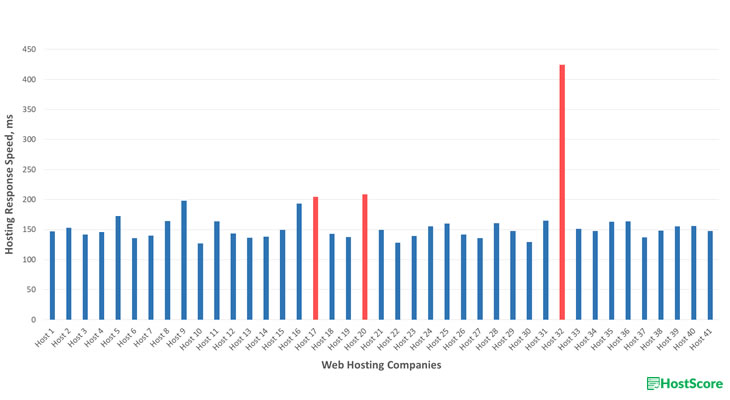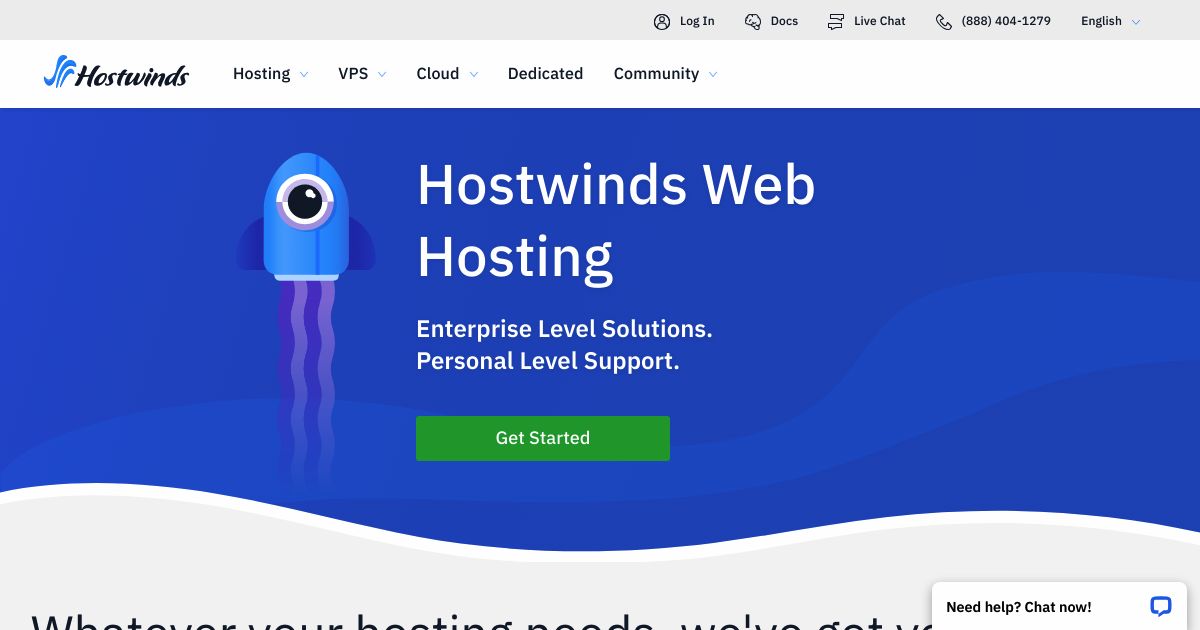TL;DR – Based on an analysis of 40+ top hosting providers, HostScore research finds that many maintain decent levels of service performance. However, the changing digital landscape needs these providers to improve offerings to meet new challenges.
When it comes to web hosting, many users have become obsessed with performance, and rightly so. Google, the world’s most popular search engine, has become the de facto gold standard towards website owners work towards a ranking on.
In view of that, pressure has been increasing on site owners to place even stronger emphasis on quality of content and improvements to site technical performance. However, there are many elements which contribute towards how well a site performs and it is not always the web host which is to blame.
Industry Size and Background
Analysts predict that the value of the global web hosting market will expand to reach approximately $76.2 billion by 2023 at a CAGR of 15.9%. This makes it one of the fastest growing web industry segments, along popular verticals such as SaaS (13.1%) and IoT (38.62%).
In terms of top industry players by volume in the web hosting space, four top brands alone occupy 28.2% of the web hosting industry market share, with many other service providers taking up a smaller piece of the pie.
However, market share alone doesn’t necessarily translate to strong user experience or optimal performance in their service offerings. HostScore research has found that many web hosting service providers offer similar levels of technical performance to their users.
Basis of Analysis
A common misconception in the web hosting arena is that website performance is the same as web hosting response speed. While the intention may be the same – faster speeds equating a better user experience – there is a marked difference in responsibility between the two.
Web server response speed, especially in the shared hosting segment, is the responsibility of the hosting service provider. Factors that contribute to this are directly affected by service provider choice in equipment, infrastructure, service partnerships, and configuration.
Along with server response speed, hosting service providers are also directly responsible for uptime, which contributes towards reliability of websites. This is another factor which affects user experience on websites.
Website speed is the result of combining web server response with the site itself. This lends a possibly significant overhead, depending on the nature and composition of the site – which is the onus of the site owner.
[ninja_tables id=”3844″]
Note: Server response speed is a subset of website performance, resulting in the host being partially responsible for website performance.
92.7% Maintain Average Speeds Below 200ms
Chart: Global Average Server Speed Fairly Consistent

Based on an aggregation of data collected from over 40 popular web hosting service providers, HostScore research finds that many providers offer similar levels of server response speed. Of those assessed, only one showed average server response speeds exceeding 400ms.
According to Google speed guidelines, web servers should ideally post response speeds as low as possible to improve user experience. However, only servers which exceed 600ms response will fail Google Page Speed audits. This gives web hosts much leeway from where they currently stand.
4.9% of web hosting providers monitored in the shared hosting space were able to maintain average response speeds of between 200ms to 400ms, while 92.7% kept response speeds to below 200ms. This was based on a global average of periodical speeds tested from ten strategic global locations.
US-based Servers Load 11% Faster
Chart: US-based Server Speed (West & East Coast)

Due to the extensive nature of data collated, HostScore research was able to conduct a comparison of responses from US-based service providers to domestic sites as well as their overseas counterparts.
In this analysis, US-based providers were noted to serve US-based sites more quickly on average at comparatives average response speeds of approximately 50ms (on the West Coast) and 44ms (East Coast).
Comparatively, overseas based servers supporting domestic sites in those locations or close by averaged significantly higher response times. Average response speeds of servers in the Europe region clocked in at 148ms in Europe while those in the Asia region (including Japan) were timed at 147ms averages.
With the majority of HostScore’s sample service providers located on the North American content, an analysis of the hosts here would be more accurate. Among providers analyzed on a continuous basis, fastest response speeds we observed for those hosting out of the US East Coast.
The top three providers on the East Coast averaged response times of 10ms as compared to the top three on the West Coast at 14.3ms.
At the global level, Singapore is typically a strongpoint for international data services due to its strategic location and high levels of advanced infrastructure. For this region, the top three fastest web hosts offered average speeds of 15.3ms.
11 Out of 41 Test Sites Scored 100% Uptime
Chart: Average Hosting Uptime

With a close performance in uptime, most service providers were able to demonstrate uptime in excess of 99%. This showed an overall market stability with only three exceptions in our sample group who were unable to exceed 98% in uptime.
In most cases, industry accepted norms lie between 99.9% to 99.95% for shared hosting services, while mission critical applications lie on an altogether different scale. In some cases, shared hosting service providers do guarantee mandated service levels but most cover reliability under a blanket ‘best effort’ basis.
Pricing Proves Indicative of Potential Web Server Performance
Chart: Fast Five vs Slow Five


Shared hosting services are the lowest priced category in the industry vertical. They offer mixed use of resources which are often capped as prescribed in terms of service which vary among providers. The exceptions to pricing in shared services are those offering free hosting services.
These free services are normally offered with a view to long-term customer conversion to paid services on the same company or a parent organization. For paid subscriptions, prices vary between a low of $0.99 per month to a high of $11.95 per month.
It should be noted that prices under observation are introductory prices for new users which increase upon plan renewal.
Based on the performance analysis of HostScore’s sample of service providers, there is an indicative correlation between price and web server performance.
In an observation of the five fastest web hosting response averages, hosts which priced plans lower were notably lower on the scale.
Additional Findings and Comments
Possible Challenges Faced by Web Hosting Providers
Due to the tight ecosystem which binds service providers on the world wide web, web hosting providers face both internal as well as external challenges in offering strong, sustainable solutions. Internally, volatile pricing in equipment and rising costs of manpower contribute to rising overheads.
Externally, many factors apply. These include locational tariffs on bandwidth, evolving products offered by infrastructure service providers, and even geographical factors which may impact service quality on a strategic level.
Examples of significant changes impacting web hosting performance and costs include:
- Significant growth of data centers in the Asia Pacific and China region.
- Growth in the number of International submarine cables.
- Relatively stagnant number of websites active.
Digital Security Threats are a Rising Concern
With the increase of digital though various elements like IoT, mobile, and eCommerce, there has been a significant rise in cybercrimes. The web space is no exemption, as it is becoming a core segment of the digital commerce ecosystem.
This places increased pressure on both site owners and service providers alike. Nominal levels of security offered by web hosting service providers could be incapable of coping with more advanced and evolving threats.
Service providers must look more closely towards the security of clients hosted in order to better protect both parties involved in this symbiotic relationship.
Non-core Elements Key to Selecting Web Host
Because of the relative similarity in performance profile among hosts under observation by HostScore research, it is highly recommended that users consider two key areas in further assessing service providers for product adoption.
The first is a closer look at site and user requirements to more accurate match products. This will enable optimal performance based on need rather than looking towards only one side of the equation. A close match will enable websites a higher chance at solving the user experience conundrum so highly placed in focus by search engines today.
The second is a higher level of attention to detail in web hosting service provider indirect benefits. These include non-core factors such as service quality levels, money-back guarantees, and possibly security offerings included in standard packages.



